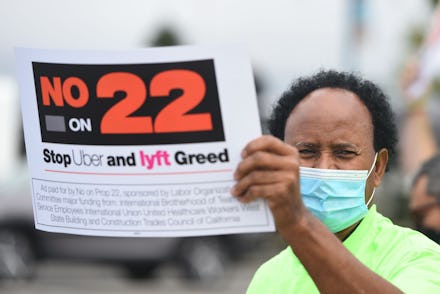Uber's Prop 22 victory in California is bad news for workers across the country

While election results continue to crawl in across the country, there was one clear loser last night: organized labor. In California, a ballot initiative known as Proposition 22 passed, with 58 percent of the state's voters supporting it. Essentially, Proposition 22 creates a carve-out for gig economy companies like Uber and Lyft, exempting them from a California law that requires employers in the state to consider contractors who work full-time hours to be employees and provide them with a minimum wage and benefits like paid sick leave. It is a very bad deal for employees — er, full-time contract gig workers.
The initiative was written by lawyers paid by Uber, Lyft, and other gig economy companies. It was put on the ballot thanks to a signature collecting campaign run by the companies, in which they paid signature gatherers $4 for each person they recruited to agree to put the measure up to a vote. Those same companies then spent more than $200 million trying to convince the public to vote "yes" with ad campaigns and a deluge of shady and coercive messages and push notifications sent to drivers and riders.
In the end, it worked. "Uber and Lyft spent $205 million, which is more than any ballot campaign has ever spent in American history, to essentially buy their own law," Steve Smith, Communications Director for California Labor, tells Mic. With Prop 22 on the books, gig economy companies will be exempt from California's groundbreaking AB5 law, which would have required Uber and Lyft to reclassify some of its contractors as employees. Now they can continue business as usual in the state, where they had previously threatened to shut down if they didn't get their way.
In addition to allowing these companies to side-step the law, there is concern that parts of Prop 22 might have set precedent that will be difficult to sort out. For one, the text of the ballot initiative includes a provision that states that in order for the state legislature to amend the proposition, they need a 7/8ths "super duper majority" in order to do so. "We've never seen that in any other measure," Smith says.
It also includes another little quirk: according to Smith, "they slipped in a little bit of language about worker organizing and collective bargaining." Essentially, Prop 22 would make it next to impossible for gig workers to organize and negotiate with the company on wages, benefits, and workplace conditions. "We don't think that's constitutional," Smith says, noting that he expects there will be legal challenges coming.
The fine text is troubling, but it's the big spending that stands out. Smith says that California is no stranger to money flowing freely on ballot initiatives, but the Prop 22 effort was at levels advocates had not previously imagined. "Spending $60, $70, $80 million versus spending $200 million are two very different things," he says. "If you can outspend your opponent by 10 to one, there's pretty good likelihood you're going to win."
That presents the looming threat that Uber and Lyft just might take this show on the road, pushing for similar ballot initiatives in states across the country in an attempt to combat other efforts by gig workers to organize. "What we've seen from these companies, historically, is that they will do anything and everything to avoid any sort of regulation of their illegal business model," Smith says. "It wouldn't surprise me that they may use similar tactics in other states."
There is also the risk that Uber and Lyft have created a blueprint that other major corporations may be able to replicate. Megan Riley, a PhD student focusing on labor issues at the UCLA Department of Information Studies, tells Mic that even if Uber and Lyft never turn a profit and one day fade into obscurity, Prop 22 will be their lasting legacy. "Imagine what misinformation campaigns about gig work legislation will look like once mega-profitable companies like Amazon, Walmart, and others get into the game," she says. "We're basically looking at the possibility of nearly every labor sector becoming gig work." She warned that corporations may use the model laid out by the gig economy giants to "codify capital-friendly and labor-exploitative gig work," stating, "there's no chance it'll just be confined to the private business sector."
If there is hope to be found for labor advocates in the Prop 22 results, Smith says that he expects it will spur more efforts by workers to fight for their rights. ""This campaign sparked unprecedented worker-led organizing in the gig economy that is going to continue and even intensify after election day," he says. "I think the organizing is just going to grow as a result."
He notes, "Uber and Lyft think that this is the end of the story, they're sadly mistaken." But Riley sees plenty of similar fights in the future brewing. "Not to sound overly dramatic, but Prop 22 should be understood by labor as an extremely serious threat not just in California, but across the US," she says. "Now is the time to organize, unionize, and prepare to fight the inevitable battles against similar legislation in other states."